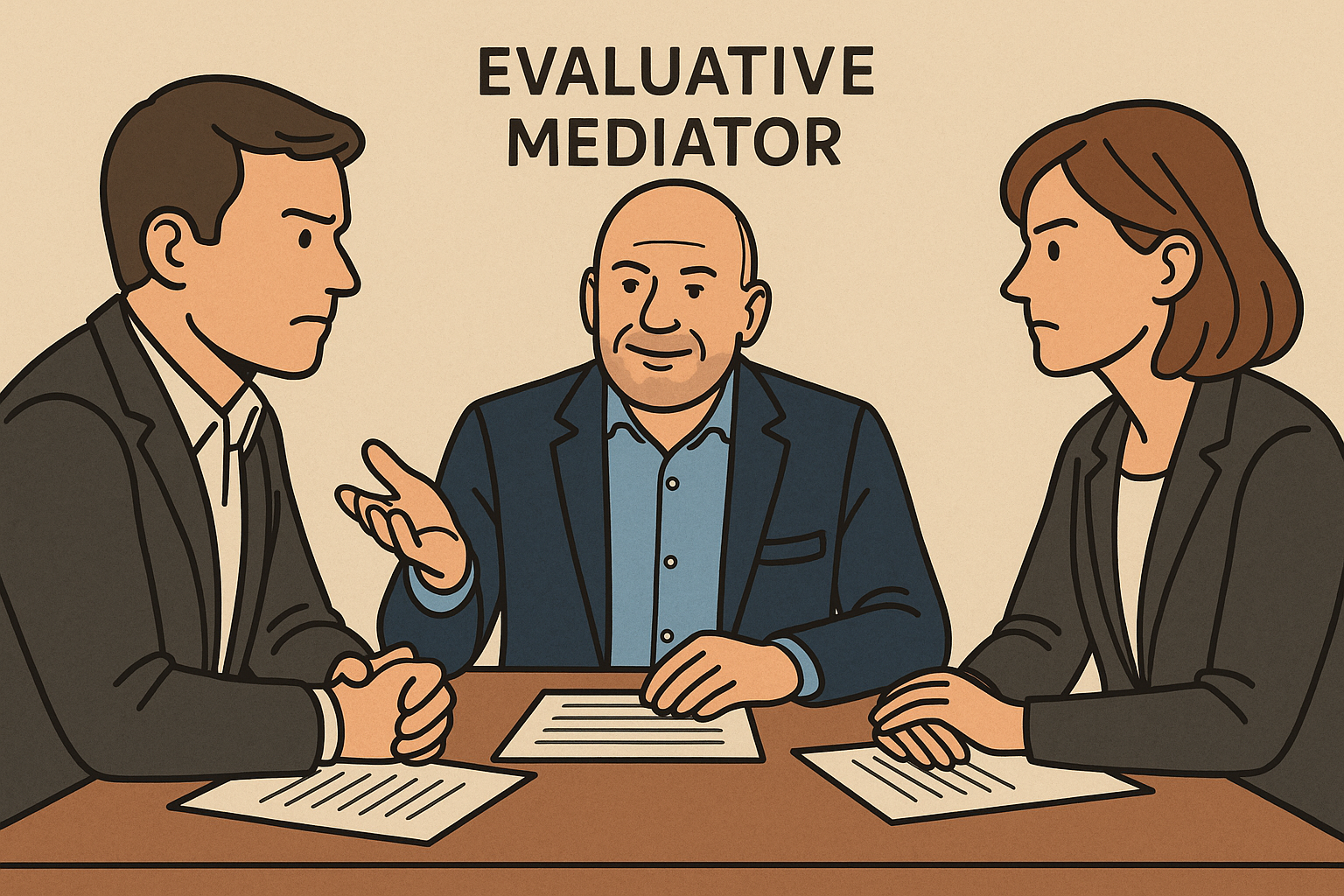The Evaluative Mediator
In the world of construction, conflict is almost inevitable. Projects are complex, many-faceted, and often involve multiple stakeholders, unpredictable site conditions, changing specifications, overly amended contracts and cashflow pressures. When disagreements arise, the prospect of sinking deeper into adversarial litigation or adjudication can feel like a leap into the abyss. It is in precisely such situations, that using an RICS evaluative mediator, that mediation becomes a powerful tool to unlock impasse and help parties move forward.
The shifting legal landscape: mediation ceases to be optional
Until recently, mediation was strongly encouraged in civil cases under the Civil Procedure Rules (CPR) but remained essentially voluntary in the small claims and lower-value arenas. The reforms now underway represent a paradigm shift. From 22 May 2024, new small claims monetary cases up to £10,000 are automatically referred to mediation under the Small Claims Mediation Service (SCMS) before proceeding to court.
Moreover, from 1 October 2024, amendments to the CPR further strengthen the court’s power and duty to promote and, where appropriate, require parties to explore ADR (including mediation) in all civil cases, not just small claims. These changes reflect the judiciary’s and government’s resolve to relieve court congestion, shorten case lifecycles, and encourage more proportionate, negotiated outcomes.
In short: mediation is no longer just an option; in many cases, it is now baked into the procedural architecture.
Why mediation matters especially in construction disputes
Construction disputes often involve legal and technical complexity as well as cultural differences resulting in a breakdown in the relationship. In respect of technical disputes, bringing such material to light in a safe, mediated environment can produce insights, trade-offs, and creative solutions that a court judgment might not permit.
Here’s why mediation is uniquely well suited in this context:
Issue-narrowing and clarity: a mediator can push parties to crystallise their claims and defences, highlight the pivotal factual, legal or technical battlegrounds, and help them see which issues really matter and which are peripheral.
Cost/time savings: resolving all or part of the dispute through agreement avoids protracted litigation or multiple rounds of expert evidence. The mediator can help structure phased settlements (e.g. agreeing liability first, quantum later).
Commercial realism: parties in construction projects often have ongoing relationships and reputational risk. A mediated settlement can allow tailored remedies (e.g. retention, performance-based instalments) that a court cannot fashion.
Confidentiality and control: unlike adversarial proceedings, mediation is private and gives parties control over whether and how to settle; nothing said is admissible unless agreed.
The distinctive value of an RICS evaluative mediator
What sets the RICS Evaluative Mediator apart is that the Mediator, in addition to the facilitative toolkit, is trained to offer a neutral evaluation if the parties wish. That is, the mediator can express an informed view on the likely outcome in court or arbitration, based on the materials revealed and their expertise in construction, quantum, risk and precedent.
This evaluative element can be a catalyst in a deadlocked dispute. When parties are unwilling to budge, hearing from a technically qualified third party, not as an arbitrator but as a mediator offering a candid assessment, can shift perceptions of risk, reduce overconfidence and bring realism to the bargaining table. In a sense, it gives mediation a dose of “adjudicative gravity” without abandoning consensual process.
In practice, parties can stipulate in their mediation agreement whether they want the mediator to remain entirely facilitative, or whether and when they might ask for evaluative input. The negotiable option gives flexibility: mediation remains a consensual, party-led process, while preserving a powerful tool if the exchange stalls.
Because RICS mediators are drawn from professionals with deep construction, commercial and surveying backgrounds, the evaluative voice carries weight precisely because it comes from someone who understands construction related issues.
How mediation with an evaluative mediator can “unlock” a dispute
Imagine two parties locked in a dispute over delay costs and extensions. Each side has their own expert reports, their own interpretation of the critical path and concurrent events. They hobble through positions and counter-positions without making progress. In that scenario, the RICS evaluative mediator can:
Probe the core assumptions: asking probing questions to expose hidden vulnerabilities in each expert’s logic or data.
Reality test each side: drawing on onward cases, risk of defeat, potential costs exposure, and commercial realities to “pressure test” each party’s expectations.
Offer a bridging assessment: perhaps saying, “If I were a judge, on the current record, I would probably allocate 40% risk to your concurrent delay argument,” thereby anchoring the discussion.
Encourage movement: by showing that extreme positions carry downside risk, encouraging each party to soften their stance and explore compromise zones.
Facilitate package deals: enabling the parties to explore structural solutions (e.g. agreeing liability but leaving quantum to be split later, or payment in stages subject to performance) that suit their cashflow or project constraints.
Such interventions can convert entrenched postures into movement, giving breathing space for settlement rather than pushing parties straight into hardened litigation.
In conclusion
The recent amendments to the CPR and Practice Directions make mediation, especially in small claims, an integral step, not an optional detour. In the construction sphere, where disputes are dense, technical and commercially sensitive, mediation offers a faster, cheaper and more flexible alternative to court battles.
Against that backdrop, the RICS evaluative mediator is a particularly potent resource: combining process facilitation with the option of expert, neutral evaluation if the parties agree. That hybrid role gives mediation both the breathing room for collaboration and, when needed, the sharp nudge of informed critique. In matters of bricks, mortar, delay and cost, that can make all the difference between gridlock and resolution.
Find out more
Neil Thody is a Fellow of the RICS, leading procurement specialist, CEDR Mediator, RICS Evaluative Mediator, RICS Adjudicator and Partnering & Independent Adviser (under collaborative contracts) working with clients across multiple sectors. Neil is also a CMC Registered Mediator.


